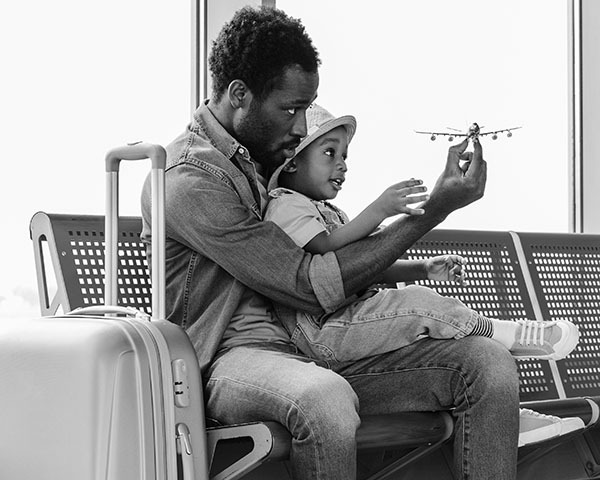Build the perfect travel plan
Give yourself the best shot at a fun and stress-free holiday by doing your homework before you go.
That’s where our holiday planning checklist comes in. We’ll show you how to plan a cheap holiday with our top tips, including how to prevent excess baggage charges.
10 key questions to help plan a holiday
When you start planning a holiday abroad there's lots to consider, and so many destinations to choose from.
Kick off by asking yourself these questions:
- What’s your budget?
Working out how much you can afford will help you narrow down your options and plan the perfect holiday without breaking the bank. - What kind of holiday are you looking for?
A family break on the beach or a city break? - What catering option is best?
All inclusive, full board, half board or self-catering? - Where do you want to go?
If you need inspiration, take a look at Tripadvisor’s top global destinations or check our latest events explorer guide. - How long do you want to go for?
A weekend, a week or two, or longer? - Short or long haul?
Our guide to air passenger duty will help you understand how the distance of your flight affects ticket prices. - When do you want to go?
It might be cheaper to plan your holiday for the off-season – but that could mean missing out on sunny days on the beach. - How do you want to book?
Would you rather book online or use a traditional travel agent? - How do you want to pay?
Decide if you want to pay upfront, with a deposit, credit card or on arrival. - Do you need a visa or vaccinations?
You may need to sort these out in advance. For vaccinations, the NHS recommends seeing a GP or private travel clinic at least 8 weeks before you travel.
Different ways to book
Spend a bit of time considering what type of holiday deal will work best for you.
Package deals
If you’re considering a traditional holiday resort, a package deal may be your best option.
Package deals can be booked through travel agencies, online booking sites or direct from the operator. And they’re typically covered by financial protection schemes like ATOL or ABTA.
Here are our top tips to find the best package deal:
- The best time to book a package holiday could be either last minute or as early as possible
- Many operators offer discounts if you book as soon as a holiday goes on sale
- For a last minute deal, Latedeals.co.uk recommends booking around eight weeks in advance
Accommodation only
If you’re booking your flights and accommodation separately to save money, there are loads of ways to find your dream hotels and apartments. Just make sure your travel insurance covers both your travel and your accommodation.
Here’s how to find the best accommodation deals:
- You can use comparison websites to find the best accommodation
- If you’re looking to book an apartment or villa, check out sites like Airbnb or HomeAway
- Check discount sites to see if there are any voucher codes for your chosen hotel
- Check prices over a few days and set up alerts for price drops; many hotels monitor demand and change their prices accordingly
- Once you’ve chosen your hotel and found the best price online, contact the hotel. You might get a better price if you book direct
Flights only
If you’ve chosen your destination and found the perfect accommodation, it’s time to search for the best value flights:
- Compare flight prices using comparison websites like Skyscanner or TravelSupermarket
- If you’re travelling to a resort that’s popular for package holidays, consider booking seats on a charter flight
- Check your flight times carefully, especially if you’re flying with a low cost airline. If your flight is early in the morning you may want to stay in an airport hotel the night before
- Remember to check that your travel insurance covers both your flights and any accommodation you book separately.
How to plan your holiday spending money
Whether you prefer to carry cash or cards, here are some top holiday planning tips to make the most of your travel money.
Cash
- Before you buy your foreign currency, monitor exchange rates in advance – they change rapidly so act quickly when you see a good deal
- Compare all offers – don’t just look for an offer with zero to low commission fees
- Look out for hidden fees – rate charges and handling fees can add a few pounds to each transaction
If you think you might return with leftover currency, look out for a good ‘buy back’ rate or no ‘buy back’ fees.
Credit and debit cards
It’s quick and easy to use your debit card abroad to buy things and withdraw cash from ATMs. Credit cards can help manage the cost of large, unexpected or emergency purchases.
Here are some key things to consider if you’re planning to use your credit or debit card abroad:
- Find out if your debit or credit card can be used outside of the UK without incurring a transaction fee
- Check the foreign conversion rate at the ATM and remember that some machines will charge a local transaction fee
- If you’re given the option to pay for a withdrawal in your home currency, rather than the local currency, don’t. Sticking with the local currency may help you avoid additional currency conversion charges
- If you’re using a credit card, remember that withdrawing money is seen as a cash advance, so you’ll be charged interest on it. You may also incur a cash advance fee
- It’s a good idea to tell your card provider you’re travelling abroad – this may stop your card being blocked due to ‘unusual transactions’
Prepaid cards
A prepaid currency or travel card, such as our Sainsbury's Bank Travel Money Card™ Mastercard®, can also be used to carry currency abroad. Its chip and PIN protected and there is no direct link to your bank account, so you can travel with confidence that your spending money is safe.
Load up to 15 foreign currencies on to the prepaid card before you travel and top it up online wherever your journey takes you.
For added peace of mind, have a look at our guide to keeping your money safe abroad.
Holiday extras - things to consider before you go
Airport parking
If you need to park your car at the airport, you could find yourself out of pocket. Here are some tips to keep the costs down:
- Save money by booking in advance through a comparison website
- Usually the cheapest option is a car park located outside the airport grounds. Just make sure you check travel times and find out if the car park provides shuttle buses to the terminal
- If you need to stay overnight before you fly, look out for an airport hotel with car parking. This could work out cheaper than booking a car park
Airport lounges
Got a long stopover between flights? Or just fancy a relaxing start to your break?
Here are some reasons why you may want to consider using an airport lounge:
- Lounges offer unlimited food and drink, newspapers and magazines – providing everything you need to get you in the holiday spirit
- Check whether your credit card or bank account offers free access – it may be a benefit you didn’t know about
- If you fly regularly, consider getting an annual pass – most of the large hub airports have lounges
- You’ll have to pay to access an airport lounge but booking entry in advance, or getting an annual pass, could cut down the cost
Car hire
If you’re looking to hire a car while you’re on holiday, there’s a lot to bear in mind. Here are some tips to help you get the best car hire deal:
- Consider booking in advance – your daily rate will often be much more affordable
- Use a comparison website to find the best deal at your chosen airport. Remember to check if booking direct with the hire company works out cheaper
- Check whether the deal includes a mileage limit – you may end up paying an additional fee if you go over this
- You may be able to buy car insurance directly from the car hire company . Or you can buy a standalone car insurance policy from another provider
Mobile phones and data
We’re all partial to posting a holiday pic on social media these days. And while it’s great to share your holiday snaps with friends and family back home, make sure you keep on top of costs.
- Check if you have free roaming in the country you’re visiting. Some mobile phone providers let you use your phone abroad as part of your standard calls, texts and data package
- If you don’t have free international roaming, consider a roaming package. Your phone provider might offer a good rate if you pre-purchase calls, texts and data
- Turn off data roaming when you aren’t using it – many apps use data even when you’re not actively using them
- Use a mapping app that allows you to download maps in advance to use offline
- Consider using messaging apps that work over wifi, like Skype, FaceTime or WhatsApp – it’s often cheaper than sending texts or making phone calls
Protect yourself and your booking
ATOL and ABTA
If possible, make sure your holiday’s covered by ATOL or ABTA. These financial protection schemes can help you get your money back if your travel company goes into insolvency.
You can find out more about ATOL protection in our guide to dealing with flight disruption.
Insurance
No holiday planning checklist is complete without proper protection.
Wherever your journey takes you, travel insurance helps to cover emergency medical expenses, lost or damaged items and more.
Check out our flexible travel insurance policies to find the best cover for you.
Sainsbury’s Bank Travel Insurance is underwritten by Great Lakes Insurance UK Limited.
Healthcare
Before you head off on your travels, find out if you need any vaccinations. The NHS Fit for Travel website is packed with health information and advice for travellers.
If you’re travelling with a medical condition, the NHS has advice on taking medicine abroad. You may also want to think about translating your medical details into the language of the country you’re travelling to.
Guides for travelling abroad
Our handy travel guides will provide you with top tips when travelling abroad.

How to plan solo travel
Going it alone? Our guide is full of useful hints and tips to make the most of your solo trip

Flying with children
Take a look at our guide for tips for a stress free flight when flying with little ones
Time to order travel money?
Get a great exchange rate and 0% commission on all foreign currencies. Use our travel money calculator to quickly convert your pounds into more than 50 currencies. Simple.
See how much you’ll get for your budget.
Any questions?
We’ve got the answers to our customers’ most common questions about travel money.
Important information
Sainsbury's Bank Travel Money Card™ is issued by PrePay Technologies Limited pursuant to license by Mastercard International. PrePay Technologies Limited is authorised by the Financial Conduct Authority under the Electronic Money Regulations 2011 (FRN: 900010) for the issuing of electronic money and payment instruments. Mastercard is a registered trademark, and the circles design is a trademark of Mastercard International Incorporated.
